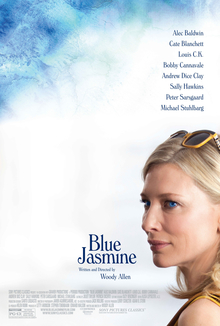Life for Jasmine (Cate Blanchett) is comfortable;
she has a rich husband (Alec Baldwin); expensive house and maids to pamper on
her every need. Jasmine’s life is simple and relaxing that is until her husband
is arrested by the FBI and loses the entire contents of the house. This means
that Jasmine has to move down the socioeconomic ladder to live with her sister,
Ginger (Sally Hawkins), in San Francisco. Struggling to cope without the riches
she married into, Jasmine always looks as though she is on the edge of a nervous breakdown.
Every armchair juror or judge is casting their
verdict on Woody Allen and the child abuse allegations he has been accused of.
Two things come to mind, to some, the phrase ‘innocent until proven guilty’ is
meaningless and those calling for Allen to be imprisoned obviously have yet to
see The Hunt which speaks out against
such Witchhunts. Anyway, I digress, while all this is happening Woody Allen’s
latest film is almost guaranteed to walk away with a least one Oscar with the
recipient being Cate Blanchett. Playing a
women on the edge of yet another nervous brake down, Cate Blanchett’s
performance is effective enough to elicit sympathy for an obnoxious and
unlikable character, of course those who regularly engage in class warfare or
don Guy Fawkes masks will be one of the groups who will find it difficult to
care about Jasmine’s sudden loss of unearned and cheated wealth.
Jasmine is a heavily flawed person; she is vain, narcissistic and
struggles to maintain any friendships other than superficial ones (as seen in her
privileged life) yet there still is an element of sympathy for a person
unprepared for the life she now has to live. Allen chooses to tell the story of
Jasmine’s collapse via flashbacks to Jasmine’s previous wealthy lifestyle
allowing the audience to compare and contrast her life in the rich suburbs of
New York to the poor areas of San Francisco, Ginger’s small apartment is a
massive contrast to Jasmine’s spacious home. This compare and contrast allows
us to see Jasmine turn from radiant, beautiful yet shallow to desperate,
vulnerable and on the brink. It also shows us that if Jasmine attempted to
sustain relationships with the new people she meets following her financial
demise she will create friendships far stronger than the ones in the privileged
days.
Jasmine’s personality flaws could have created a barrier that prevented
people from sympathising with Jasmine. Many critics have compared Blue Jasmine to Tennessee Williams’ A Street Car Named Desire but you can
also draw up a comparison between The
Iron Lady, Phyllida Lloyd’s shallow Maggie Thatcher biopic, in which an
unlikable person (depending on your political opinion of course) is given
sympathy because of the mental illness affecting their life. In addition to Cate Blanchett’s
superb central performance are a number of excellent supporting performances,
particularly by Sally Hawkins whose Ginger has an
interesting relationship with Jasmine.
When it
all threatened to go awry, Cate Blanchett’s
faultless central performance, capturing the character perfectly at her peak
and lowest, keeps the viewer interested and sympathetic to her demise.
4/5




Good review. But what's your grade?
ReplyDeleteOooh. I forgot.
DeleteThis is a really good movie and Im just upset that all of these allegations will hinder many people from checking it out. Interesting that you would compare this to "The Iron Lady" I may have to seek that one out.
ReplyDeleteI would understand that desire to skip any Allen's film, as I understand why people avoid the films of Roman Polanski or the music of Chris Brown, if he has been proved guilty in a court of law, but that has yet to happen.
Delete